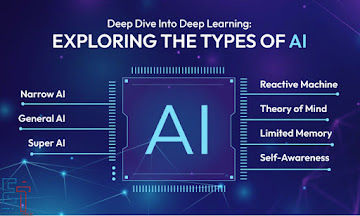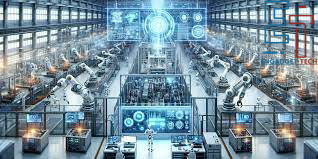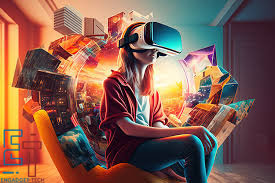Artificial General Intelligence
Artificial Intelligence:
"Artificial Intelligence (AI) is the creation of machines that emulate human-like thinking and reasoning."
It empowers systems to independently absorb knowledge,
solve challenges, and adapt to changing scenarios. Through algorithms, AI
learns from data, predicting outcomes and optimizing tasks. Its applications
range from automating everyday functions to pioneering innovations in areas
like robotics and decision-making. While current AI is task-focused, future
advancements aim to develop more flexible, intuitive, and holistic
intelligence.

Types Of AI:

Based On Capabilities:
Narrow
AI (Weak AI):
"AI
designed for a specific task or a narrow range of tasks."
Example: Siri,
Alexa, recommendation systems, self-driving cars.
General AI (Strong AI):
" It is a theoretical AI that can understand,
learn, and perform any intellectual task a human can, with the ability to
adapt, reason, and possibly exhibit self-awareness."
Super AI:
"It
is a hypothetical AI that surpasses human intelligence in all areas, including
creativity, problem-solving, and emotional understanding, potentially evolving
beyond human control and comprehension."
Based on Functionalities:
Reactive Machines:
"AI
that reacts to specific situations without storing memories or past
experiences."
Example: IBM's
Deep Blue (chess-playing AI).
Limited Memory:
"AI
that can use past experiences to inform current decisions but does not store
memories long-term."
Example: Self-driving
cars that use sensors and past observations to navigate.
Theory of Mind:
"AI
that understands emotions, beliefs, and thoughts of other entities (human-like
cognition)."
It
has still under development in AI research.
Self-Aware AI:
"AI that has consciousness, self-awareness, and the ability to understand its existence."
It
is purely theoretical and not yet realized.
Applications Of AI:
"AI
is transforming healthcare by improving diagnostic accuracy, optimizing
treatment plans, predicting patient outcomes, and aiding drug discovery."
Example: IBM’s Watson
Health, AI-powered diagnostic tools that analyze medical images, and
wearable devices that track patient vitals in real time.

Manufacturing:
"AI
is revolutionizing production processes by enabling predictive maintenance,
optimizing supply chains, and enhancing quality control."
Example: AI-driven
robots used in factories for precision tasks, automated quality inspection
systems using computer vision, and smart supply chain management.

Retail:
"AI enhances customer experience through personalized product recommendations, dynamic pricing, inventory management, and chatbots for customer service."
Example:
AI-driven recommendation systems on platforms like Amazon or Netflix suggest
products or content based on user preferences.

Transportation:
Example: Tesla's
Autopilot, Waymo’s self-driving cars, and AI-powered delivery
drones or route optimization systems for logistics companies like UPS.

Entertainment:
Example: Netflix's
recommendation algorithm, AI-generated digital characters in video games, and
tools like DALL·E or MidJourney that create
digital art from textual descriptions.

Education:
Example: AI-driven
platforms like Duolingo and Coursera that
adapt to individual learner’s pace and style, AI-based exam grading systems,
and virtual tutors.

Advantages
Of AI:
Automation:
Reduces
human labor for repetitive tasks.
Efficiency:
Processes
data faster than humans.
24/7 Operation:
Works
continuously without breaks.
Accurate Insights:
Provides
data-driven analysis and predictions.
Cost-effective:
Lowers
operational costs through automation.
Personalization:
Tailor
experiences for individual users.
Scalability:
Easily
handles growth without major cost increases.
Enhanced Security:
Detects
threats and protects data efficiently.
Healthcare Innovations:
Supports
diagnostics and personalized treatment.
Disadvantages Of AI:
Automation can lead to
loss of jobs.
High
Costs:
Developing and
maintaining AI systems is expensive.
Lack
of Creativity:
AI lacks human
creativity and emotional intelligence.
Privacy
Concerns:
AI systems can invade personal
privacy with data misuse.
Security Risks:
AI systems can be vulnerability to cyber attacks.
Conclusion:









0 Comments